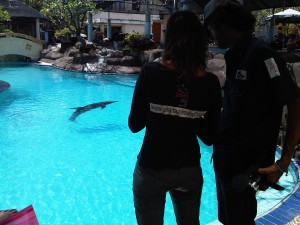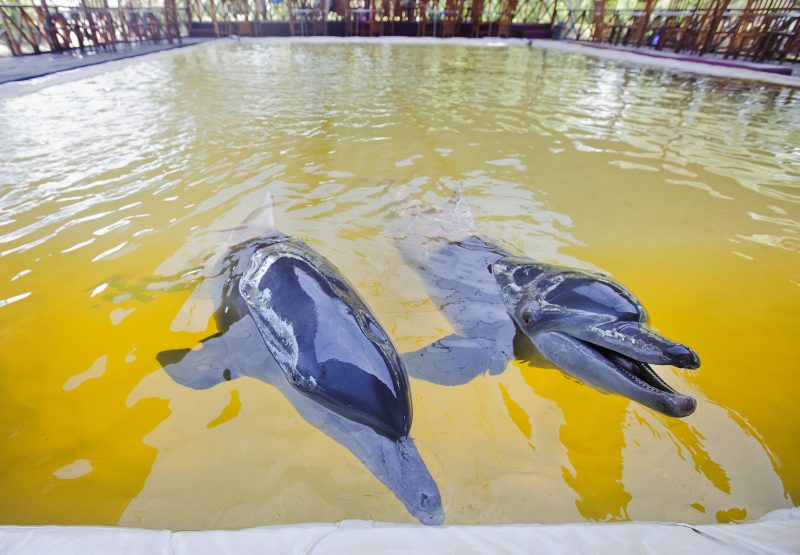Despite research that shows dolphins to be highly sensitive and intelligent, numerous facilities in Bali continue to hold the cetaceans captive for commercial gain.
With India recently declaring dolphins to be ‘non-human’ persons, and banning all dolphin shows, it might come as a surprise that Indonesia is home to some of the last remaining travelling dolphin circuses in the world. Most notably, the Wersut Seguni Indonesia in Kendal, Central Java, reportedly loans and sells dolphins to entertainment facilities around the country, including Bali. In fact, besides Java, the holiday island takes an unsettlingly active role in the commercial exploitation of these highly intelligent mammals.
The latest dolphin moneymaking enterprise to open in Bali has attracted a storm of criticism from civil society organizations, both in Indonesia and internationally. The Wake Bali Adventure Park in Keramas currently holds four dolphins in a 10 by 20-metre chlorinated pool; a practice many say could harm and eventually kill the mammals.
“Surprisingly, this complies with the highly criticized official standards created by the Ministry of Forestry in 2014, which state that captive dolphins only need a pool that is two metres deep and twice the dolphin’s length,” says Femke Den Haas, a wildlife rescue and rehabilitation coordinator, and founder of the Jakarta Animal Aid Network (JAAN).
Such substandard requirements are shocking, especially considering that dolphins are completely unsuited to life in captivity. “Dolphins are very social. In the ocean, they swim tens of miles per day with other dolphins. Inside pools, they can only swim in circles, reach no depth and can’t swim in straight lines,” Den Haas says. “They are also unable to use their sonar in pools, which is very important for communication and navigation in the ocean, as it bounces back at them from the concrete walls.”
“In the ocean, dolphins would be feeding on live fish, while in captivity they are fed only during work hours. They are rewarded with a piece of fish after each trick,” she continues. “This means that they are kept hungry so that they perform. The dolphin travel shows even make them jump through hoops of fire. A dolphin would only ever do this if really desperate for food.”
Den Haas visited the four dolphins just after their arrival at the Wake Bali Adventure Park last year and held a protest at the opening of the facility. “The dolphins were still very healthy at the time as they were just brought in, yet within one year one of the dolphins went blind from the chlorine in the pool,” she says. “The dolphin was then taken back to Wersut Seguni Indonesia in Central Java, a 30-hour journey, and swapped for another one.”
According to Den Haas, over 25 wildlife organizations have sent letters expressing their concern about the dolphins held at the Wake Bali Adventure Park to the Environment and Forestry Ministry (it is the Environment and Forestry Ministry, rather than the Ministry of Marine Affairs and Fisheries, that oversees dolphins in captivity in Indonesia) but with little success. Even a petition demanding the release of the four dolphins signed by 500,000 people failed to make any difference.
Unfortunately, this inaction is not unusual. After the Minister of Environment and Forestry agreed to the release of the dolphins held at Bali’s Akame Dolphin Bay Restaurant in 2013, the dolphins simply ended up at the Wersut Seguni Indonesia captivity centre in Java. “The dolphins were supposed to be released, and the Minister had already agreed to their relocation to the JAAN Karimun Jawa Rehabilitation Centre,” says Den Haas. “Instead, they were taken by night to Wersut Seguni Indonesia. To this day, nothing has been done about this.”
It is not just the Wake Bali Adventure Park that mistreats the cetacean for commercial gain. Den Haas says that aside from the numerous dolphin facilities in Java, dolphins are currently held at the Melka Hotel in Lovina and the Dolphin Lodge in Serangan, Bali. “While the Melka Hotel keeps its dolphins inside chlorinated small pools, Serangan keeps them in the bay. The water there is dirty with a lot of rubbish and plastic, and the dolphins are confined to small cages.”
The practice of capturing and holding dolphins captive for the purpose of commercial exploitation is actually illegal under the Law on Biodiversity No. 5, 1990, which states that dolphins can only be held captive for the purpose of research or rescue. Unfortunately, many are using legal loopholes to continue the cruel practice of capturing, trafficking and exploiting the mammals.
“It’s easy to mislead the authorities as to whether the dolphins were captured or indeed rescued after they got entangled in fishermen’s nets,” Femke says. “Even if a dolphin somehow got caught in a net – which is unlikely – the Indonesian law states that they should be released back to the ocean immediately. Despite this, the Ministry of Environment and Forestry keeps allowing commercial institutions such as Wersut Seguni Indonesia to keep dolphins after reportedly being rescued.”
While the appropriate legislation and rehabilitation facilities for dolphins are more or less already in place, it seems that not many are taking notice. Let’s hope that the continued pressure from civil society organizations and more people refusing to see dolphins in captivity will encourage the government to take action and prove to the world that Bali, and Indonesia, stand against animal cruelty.
For more information about Jakarta Animal Aid Network, please visit www.jakartaanimalaid.com
Dolphin educational video by Jakarta Animal Aid Network and Friends of Animals Jogjakarta:




